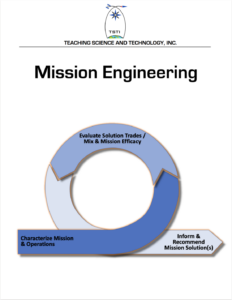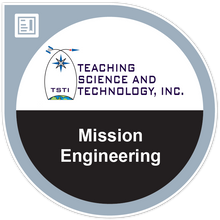Current Status
Price
Get Started
This course is available with a live instructor
onsite or through a virtual platform.
A Systems Approach to Delivering Superior Mission Outcomes
Course Description:
Developing and fielding new capabilities or system upgrades requires an intimate understanding mission outcomes in an operational context. The number of contributors to mission outcomes is nearly infinite and new capabilities rely on existing legacy systems to produce integrated outcomes. The mission engineering methodology guides the discovery of meaningful relationships and measurable tradeoffs to support conclusions based on measures of merit that matter. This 2 or 3 day course in Mission Engineering (ME) examines the deliberate planning, analysis, organization, and integration of current and emerging operational and system capabilities to achieve desired mission effects. The course takes a top-down, systems engineering approach to enhance current capabilities, integrate new technologies, facilitate system interdependencies, and define architectures to guide the development of prototypes, experiments, and systems of systems to for specific reference missions and to close overall mission capability gaps. ME explores systems and systems of systems in an operational mission context to inform stakeholders about building the right things, not just building things right, by guiding capability maturation to address mission needs. Digital engineering and MBSE design principles are highlighted through threaded examples organized around DoDAF/UPDM and other frameworks. Course exercises challenge participants to apply ME to real-world problems and illustrate practical application of ME tools and techniques. This course is designed for project managers, systems engineers, technologists, subsystem engineers or modeling and simulation analysts who are participating in or responsible for designing and analyzing new systems and capabilities.
At the end of this course you will be able to:
✦ Describe the big picture challenges of Mission Engineering in the context of mission characterization, solution evaluation and documented decisions
✦ List and define key objectives of Mission Engineering as they relate to Systems Engineering and Mission Architecture
✦ Identify scenarios and missions threads within a system CONOPS
✦ Characterize the various types of models and understand their role in Mission Engineering
✦ Apply metrics to specific mission scenarios to capture mission effectiveness, performance, and outcomes including sensitivity to overall mission success
✦ Associate relevant performance parameters and modeling results to assess individual solution options in the context of defined ME metrics
✦ Analyze scenarios including threat capabilities at a given timeframe for various CONOPS alternatives
✦ Formulate a comprehensive ME study plan to assess a given domain-specific scenario using the DoD Mission Engineering Guide
✦ Module 1—Introduction to Mission Engineering
• ME Definitions
• Intro to Systems Engineering and MBSE
• ME Approach & Methodology
✦ Module 2— Mission Characterization and Operations
• Key Questions to Identify Mission Gaps
• Mission Threads and Operations Decomposition
• Metrics and Mission Utility Assessments
✦ Module 3—Solution Trades and Capability Mix
• Mission Architectures
• Modeling Approaches
• Trade Studies & ME Thread Analysis
✦ Module 4—Inform and Recommend Mission Solutions
• Decision Support
• Integration Considerations
✦ Optional—Integrated MBSE Exercise
• Integrated implementation with MBSE environment
Each participant will receive:
• A complete set of course notes with copies of all slides used in the presentations

Sample Handout – coming soon!



